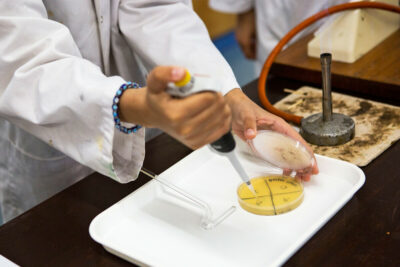This exciting course is challenging and requires a mature and independent approach to study; Emphasis throughout the course is on developing knowledge, competence and confidence in practical skills and problem-solving. Students learn how society makes decisions about scientific issues and how Chemistry contributes to the success of the economy and society. Chemistry A-level is a rigorous subject highly respected for its academic challenge by top universities and courses.
Key Stage 5 – Year 12/13
What will I Study?
We follow the OCR A Chemistry course and use a wide variety of approaches to deliver subject content – lectures, videos and practicals. Independent study is also hugely important. Students will be expected to give their own presentations on selected areas of the syllabus. There may also be the opportunity to attend external lectures.
 The topics studied are:
The topics studied are:
- Practical Skills
- Foundations in chemistry
- Periodic table and energy
- Core organic chemistry
- Physical chemistry and transition elements (A-level only)
- Organic chemistry and analysis (A-level only)
How will I be assessed?
There are 12 basic practical skills which will be covered over the two years, which will be tested in the examination papers. In addition, students have the opportunity to gain a certificate of Practical Endorsement which is required by some universities and courses.
AS
There are 2 papers, worth 70 marks, which assess content from modules 1- 4, including practical skills.
A-level
Paper 1 (2 hours 15 minutes) assesses content from modules 1- 4, including practical skills and is worth 37% of the A-level.
Paper 2 (2 hours 15 minutes)) assesses content from modules 5-8, including practical skills and is worth 37% of the A-level.
Paper 3 (1 hour 30 mins) assesses content from modules 1 – 8, including practical skills and is worth 26% of the A-level
The papers contain a mixture of multiple choice, structured questions and extended response questions, covering theory and practical skills
Future opportunities
Chemistry is an essential requirement for those considering a career in medicine and for some veterinary science courses. It is particularly useful for those seeking a career in other medical fields including dentistry, pharmacy, pharmacology and drug research. It also opens up opportunities to study Biochemistry, Chemical Engineering, Art Restoration and many other varied courses.
Combinations
As well as the obvious combinations with Biology, Physics and Mathematics, many pupils combine Chemistry with Economics, Geography, Psychology or a Language.

